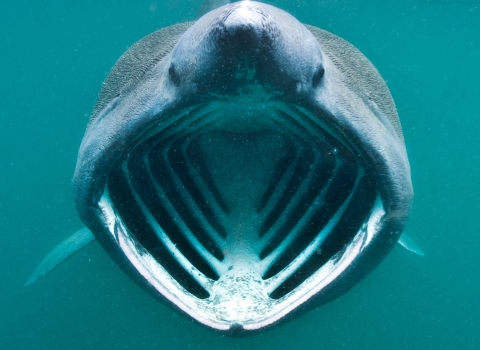
Basking shark ©Alex Mustard/2020VISION

Basking shark ©Alex Mustard/2020VISION
Basking shark
Scientific name
Cetorhinus maximusWhen to see
May to SeptemberSpecies information
Statistics
Length: up to 12mWeight: up to 6 tonnes
Average Lifespan: unknown, thought to be around 50 years
Habitats
About
The basking shark is the second largest fish in our oceans - its relative the whale shark being the biggest. Despite their size, basking sharks only feed on zooplankton which they filter out of the water, swimming slowly back and forth with their enormous mouths wide open. They are most commonly seen in the summer, when they arrive in British waters. Courtship behaviour has been seen off the Isle of Man - so perhaps they arrive here to breed! For your best chance of spotting them, visit Cornwall, the Isle of Man and the Inner Hebrides. They can be seen from cliffs, but your best chance is to take a boat trip with a reputable wildlife watching company.How to identify
The large, black, triangular dorsal fin moves slowly through the water, with the tail tip and bulbous snout often visible above the waves too. The basking shark has a massive, grey body and swims with its cavernous mouth agape.Distribution
Found all around our coasts, but most frequently sited around the south-west of England, Wales, Isle of Man and west coast of Scotland.In our area
In recent year there has been an increase in the number of sighting of these gentle giants around Ireland due to an active research and conservation interest for Basking sharks.
If you're lucky enough to see a Basking shark they are most commonly spotted off the coasts of Donegal, Mayo, Cork and Kerry! Keep an eye out during the Summer months as in these warmers periods Basking sharks will move closer inshore to find the highest density of plankton.
Did you know?
The basking shark may be huge but we still know very little about this elusive giant. Satellite tracking has shown that they can migrate long distances in the winter, with some showing up off the Azores and even Newfoundland. However, some fishermen have reported seeing them in midwinter in the UK and they sometimes wash up dead in the winter after storms.The Wildlife Trusts are working with fishermen, researchers, politicians and local people towards a vision of 'Living Seas', where marine wildlife thrives.
In recent year there has been an increase in the number of sighting of these gentle giants around Ireland due to an active research and conservation interest for Basking sharks.
If you're lucky enough to see a Basking shark they are most commonly spotted off the coasts of Donegal, Mayo, Cork and Kerry! Keep an eye out during the Summer months as in these warmers periods Basking sharks will move closer inshore to find the highest density of plankton.

